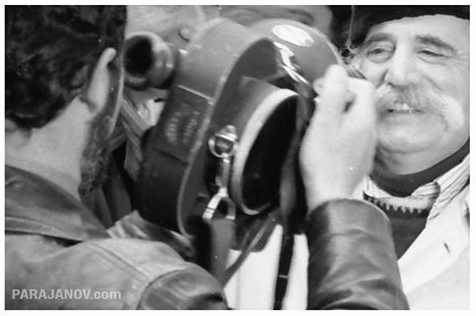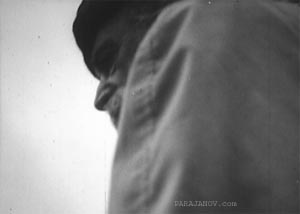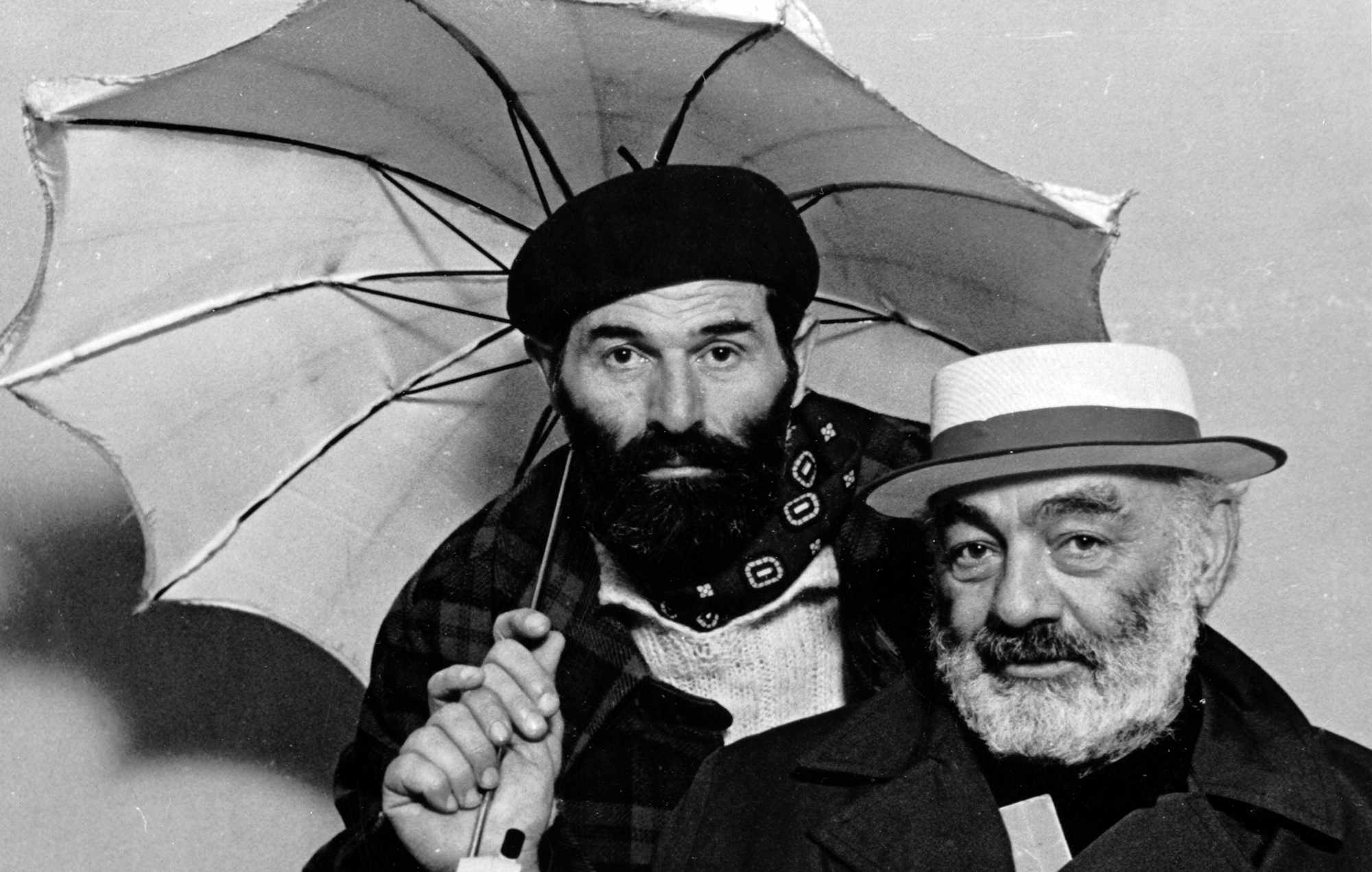William Saroyan

WILLIAM SAROYAN was…
…the first to let it all hang out, the first to cast aside social and psychological considerations and to write like a child in wonderland…
— ARTHUR MILLER
…the first and still the greatest of all the American minimalists.
— KURT VONNEGUT
…one of the most underrated writers of the century. He takes his place naturally alongside Hemingway, Steinbeck and Faulkner.
— STEPHEN FRY
William Saroyan wrote a great play (The Time of Your Life) on this theme, that purity of heart is the one success worth having.
— TENNESSEE WILLIAMS

The American Oscar-winning author and the Pulitzer Prize recipient William Saroyan (1908-1981) travels around Armenia – his ancestral homeland. His days, public speeches and private conversations with fellow Armenians are lensed by Mikhail Vartanov whom Saroyan nicknamed “Eyemoman” after the early 20th century movie camera Eyemo.
CAST and CREW:
William Saroyan, Silva Kaputikyan, Victor Hambartsumian. G. Balasanian (director), M. Vartanov (cinematographer)
WILLIAM SAROYAN BIO:
Albeit forgotten, William Saroyan is one of the most important American writers of the 20th century along with John Steinbeck, Ernest Hemingway, John Updike and others. Saroyan is perhaps the only writer to receive both the Pulitzer Prize and the Academy Award, and his work continues to appear on the theater stage and the silver screen worldwide.
William Saroyan gained world fame with his classic book The Daring Young Man on the Flying Trapeze (1934). He was born on August 31, 1908 in the Californian town of Fresno to Armenak Saroyan and Takoohi Saroyan, Armenians who escaped from the genocidal Turkish Ottoman Empire just before its fall (and where Turks later perpetrated the 1915 Armenian Genocide). William Saroyan’s unmistakably American literary works were deeply rooted in his Armenian heritage and he soon established himself as one of the preeminent short story writers, playwrights and novelists in the United States.
In 1939 and 1940 William Saroyan’s “My Heart’s in the Highlands” and “The Time of Your Life” were staged for theater and “Love’s Old Sweet Song” opened on Broadway and he received New York Critics Circle Award. In the late 1930s and 1940s, William Saroyan worked for Columbia Pictures and MGM in Hollywood.
In 1943 William Saroyan’s MGM screenplay The Human Comedy was novelized and published and received great reviews. In 1944 Saroyan received the Academy Award for Best Writing Original Story for The Human Comedy. Together with composer Ross Bagdasarian, Saroyan wrote the lyrics of a famous # 1 hit song “Come On-a My House”, performed by Ella Fitzgerald, Ray Charles, and George Clooney’s aunt Rosemary Clooney. It was selected by the great Akira Kurosawa for his filmf Ikiru (1952) and is also heard in Madonna’s 2002 film “Swept Away”.
William Saroyan passed away in 1981 at age 72. “Everybody has got to die, but I have always believed an exception would be made in my case.” Half of his ashes were buried in California, and the other half in Armenia’s capital at the Pantheon near Paradjanov and composers Aram Khachaturian and Komitas.
In 2007, his book “The Laughing Matter” was made into a Cannes Film Festival-winning Russian film “Izgnanie” (Banishment). William Saroyan’s son, Aram Saroyan, and grand-daughter, Strawberry Saroyan, are also revered writers. His nephew Hank Saroyan is an Emmy Award-winning filmmaker. Stanford University in California holds one of the largest collections of William Saroyan’s papers, and awards the prestigious literary prize named in his memory.
WILLIAM SAROYAN QUOTES:
” I should like to see any power of the world destroy this race, this small tribe of unimportant people, whose history is ended, whose wars have all been fought and lost, whose structures have crumbled, whose literature is unread, whose music is unheard, whose prayers are no longer uttered. Go ahead, destroy this race. Let us say that it is again 1915. There is war in the world. Destroy Armenia. See if you can do it. Send them from their homes into the desert. Let them have neither bread nor water. Burn their houses and their churches. See if they will not live again. See if they will not laugh again. See if the race will not live again when two of them meet in a beer parlor, twenty years after, and laugh, and speak in their tongue. Go ahead, see if you can do anything about it. See if you can stop them from mocking the big ideas of the world, you sons of bitches, a couple of Armenians talking in the world, go ahead and try to destroy them “
WILLIAM SAROYAN TRIVIA:
William Saroyan met Charlie Chaplin
William Saroyan made fun of Ernest Hemingway
William Saroyan met Martiros Saryan
“I like William Saroyan, the writer. I read his plays when I was, like 22. And he [William Saroyan] said one line talking about his work. He was asked ‘Why do you write?’ He said ‘because it’s the only way I chose to survive’. And that was literally in front of me going through rejection year after year.”
—DUSTIN HOFFMAN
“‘I thought writers were quite old. Of course (William) Saroyan isn’t old. I met him at a party, and really he isn’t old at all. In fact, ” she mused, ‘if he’d give himself a closer shave…by the way, is Hemingway old?'” (Holly Golightly in Breakfast at Tiffany’s by)
—TRUMAN CAPOTE
WILLIAM SAROYAN BOOKS:
The Daring Young Man on the Flying Trapeze (1934)
Inhale and Exhale (1936)
The Trouble With Tigers (1938)
Love Here Is My Hat (1938)
My Name Is Aram (1940)
The Human Comedy (1943)
Tracy’s Tiger (1951)
The Summer of the Beautiful White Horse (1938)
The Adventures of Wesley Jackson (1946)
Rock Wagram (1951)
The Laughing Matter (1953)
Love (1955)
Papa You’re Crazy (1957)
Here Comes, There Goes, You Know Who (1962)
Gaston (1962)
One Day in the Afternoon of the World (1964)
Days of Life and Death and Escape to the Moon (1970)
Places Where I’ve Done Time 1972 (original printing possibly 1957)
Chance Meetings (1978)
Obituaries (1979)
Births (1983)
My name is Saroyan (1983)
An Armenian trilogy (1986)
Madness in the family (1988)
The Man With The Heart in the Highlands and other stories (1968)
The Time of Your Life (1939) – won Oscar, Pulitzer and NY Drama Critic’s Award
My Heart’s in the Highlands (1939)
Elmer and Lily (1939)
The Agony of Little Nations (1940)
Hello Out There! (1941)
Across the Board on Tomorrow Morning (1941)
The Beautiful People (1941)
Bad Men in the West (1942)
Talking to You (1942)
Coming Through the Rye (1942)
Don’t Go Away Mad (1947)
The Slaughter of the Innocents (1952)
The Oyster And The Pearl (Television Play) (1953)
The Stolen Secret (1954)
The Cave Dwellers (1958)
Hanging around the Wabash (1961)
The Dogs, or the Paris Comedy (1969)
Armenians (1971)
Assassinations (1974)
Tales from the Vienna Streets (1980)
The Parsley Garden
Third day after Christmas (1926)
Resurrection of a Life (1935)
Gaston
An Ornery Kind of Kid
The Parsley Garden
The Shepherd’s Daughter
The Hummingbird That Lived Through Winter
WILLIAM SAROYAN (SELECTED) CINEMA:
The Good Job (1942) | short film by William Saroyan
Human Comedy (1943) | won Academy Award (Oscar)
Ikiru (1952) | by Akira Kurosawa (song Come On-a My House)
The Tonight Show Starring Johnny Carson (15 March 1972)
Time Of Your Life (1976) | William Saroyan, narrator
William Saroyan: I Saw the Mighty Armenia (1977)
Banishment (2007) | Cannes Film Festival winner

You must be logged in to post a comment.